by Allister Thompson
Despite the ominous title of this piece, I come not to judge, but to praise. Anathema is a British rock band that has gone through many stylistic permutations, far more than is normal for successful bands, on the way to becoming one of the world’s most meaningful and sweetest-sounding musical units. I have already written a couple of reviews that provide background, of the recent release distant satellites and of a related solo release, The Passage, so if you don’t know anything about the band go read the introductions to those reviews.

The current Anathema line-up as of 2014, featuring three Cavanaghs on the right.
A fairly new addition to my listening life, I happened upon Anathema’s music the old-fashioned way: via YouTube (a little sarcasm there). A chance click led me to view a live video, which led to the purchase of the album Weather Systems, which led to me getting hooked. Let’s put this in perspective. I’m forty. I have played, in many bands and solo, for over twenty-five years. I also review music and have approached being an obsessive music collector at times. I’ve probably heard, literally, like, a million albums. I enjoy a lot of music when I hear it, for sure. But it’s been a while since I felt that thrill of discovery about a rock band (it happens to me with ambient and Central Asian music all the time); you know, the one where you realize this music and these lyrics were meant just for someone with your exact character and nature, and you’ve sort of come home as a listener, so to speak. It’s a hard feeling to describe, but if you really love music, you’ll know exactly what I mean.
I think my spouse was pretty bemused when I made her sit through an entire concert video over breakfast one Saturday without explaining my interest in advance. I’m normally a cynical bastard, so my falling head over heels for some rock band is indeed unusual at this stage of the game.
Even more pleased was I to find out that the band has a large and extensive back catalog to explore. When I really like a musician’s work, I will eventually and inevitably write a bigass article on their discography; it’s my way of saying thanks for the tunes, and you’ll find such articles peppered throughout this site.
Anathema today has a sound that is grand and lavishly arranged, in the tradition of the best prog-rock. It features straightforward, heartfelt lyrical emotions but with a fine poetic sensibility, like the best of those un-ironic eighties heart-on-sleeve bands. It has two of the best rock singers in the world and some of the best songwriting. It is not light music; it’s for the very serious-minded. It’s often sorrowful but in latter years has been served with extra helpings of joy. Anathema has grasped that we spend our lives in a dualistic world and sadness can’t exist without its opposite, and vice versa. Now they are mining all aspects of the human condition rather than just the darker, seemingly hopeless ones.
However, earliest releases are in the doom/gothic metal style, which is not my cup of tea. Don’t get me wrong, I spent six years with hair down my back playing in a hard rock band on bills with lots of different kinds of metal bands, and I like my share of heavy music; however, the relentless moany misery of this kind of music is just not my thing. While I have found some virtues in Anathema’s earliest recordings, my perceptions expressed here would be coloured by a lack of interest in the genre they were so firmly placed in, so I leave it you to explore Serenades, Eternity, and The Silent Enigma if you please. I’ll start this annotated discography in 1998, when Anathema started developing a serious interest in expanding its sound well beyond the boundaries of tragic metal.
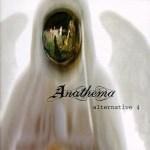 Alternative 4 – 1998
Alternative 4 – 1998

My most recent purchase is an interesting album in which the big metal guitars and mordant attitudes start to clash with a more questing musical spirit. Some reviewers have described the music on this album and Judgement as “alternative”, but that’s not cutting it; there’s still plenty of metal here but mixed with Goth and even classical influences. What hasn’t changed is the overall mood of deliberate dreariness. This is the last album with founder and co-writer Duncan Patterson, before the group became totally dominated by the Cavanagh bros. You know, the closest approximation in overall vibe I can come up with is Metallica circa the Black Album. And that is the first and last time you will likely see the word “Metallica” on this site, I promise. Mind you, this album isn’t as heavy as all that; while “Fragile Dreams” is a fairly heavy single with a metal stomp, the introduction features a violin (there’s also a great violin solo on “Lost Control”). The mixture of power riffs with attempts at musical subtlety and variety are mostly appealing, but the band’s grandiosity gets the better of it on the title track, which has a silly Monty Python-esque monolog at the end (it’s just as silly as Thin Lizzy’s “Angel of Death” in that regard). For the most part super-singer Vincent Cavanagh acquits himself well, though there’s a touch of that old moany doom metal tone in his otherwise perfect voice, which is still very mannered, not unencumbered as it would later be. Nonetheless, “Inner Silence” is a lovely ballad that is only enhanced by the big power chords. On the whole, the formula here is: big guitar, synth washes, classical piano touches, bleak lyrics and tons of melancholy. Not the most grown-up style, I suppose, but it does still have emotional power in an overblown, gothic way.
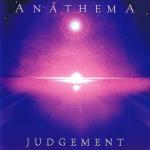 Judgement – 1999
Judgement – 1999

This fine album is basically a refinement of the previous release’s aims, with some of those overblown touches toned down. It’s leaner and more powerful, though in some ways the sorrow is ramped up, if that were even possible! Perhaps more measured would be a good way to put it, and hence more devastating. Silly reviewers again called it “alternative” or “Floydian” but really this is an excellent progressive metal album (okay, the elegant instrumental closer “2000 & Gone” is pretty Floydian). This is a far superior album for a number of reasons; Alternative 4 is trying far too hard and eagerly to integrate interesting and creative touches, perhaps to establish an artistic identity. Here the band expertly combines big metal riffs and a number of absolutely killer, creative guitar leads from Daniel Cavanagh with softer textures and less melodrama. Vincent Cavanagh’s vocal style is not as affected, bringing out the natural clarity of his voice (and he has an astonishingly pure voice). The production is great overall. There are a number of great songs, such as the riffery and big chorus of “Pitiless” (and some nice phasing in the midsection), the mordant goth-rock of “Deep” and the dark folk power ballad “Anyone, Anywhere”. But the “highlight”, so to speak, is the great “One Last Goodbye“, which concerns the death of the Cavanagh bros’s mother. It’s truly sad that it took such a tragedy to provide us with an incredible song and performance, but it really is breathtaking, not just for the heartwrenching emotion expressed, but in the way you can feel their totally focused quest for perfection in every single note played and arranged; one of the finest, purest vocal performances you’ll ever hear, and one of the most emotive, carefully constructed guitar solos I’ve had the privilege of hearing. A perfect elegy that the brothers should be, and one would hope are, very proud of. It took me a while to get on board with this album but I now find it one of the band’s finest, and definitely the artistic culmination of their early years. Plus it rocks in several places too!
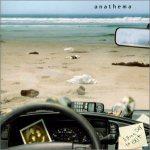 A Fine Day to Exit – 2001
A Fine Day to Exit – 2001

I guess you could call most of Anathema’s albums “transitional”, since the band is constantly progressing and evolving (a very good thing), but this one is definitely trying for something new. And not in the best way, alas. Clearly Anathema wanted to head in a new direction even further away from metal but had not found their niche in the modern progressive world alongside the likes of Porcupine Tree. Back around the millennium the world was still reeling from the impact of Radiohead having the temerity to actually bring art-rock into the mainstream, and lots of people were influenced by this. I really do think that seeped into Anathema (particularly V. Cavanagh, whose vocals are often a bit too cute for me here), and while it makes for a decent listen of an album, it feels a bit like a different band — an “alternative” one, genre-wise, very much of its time, like, say, Travis, rather than one blazing its own trail. Yet. But there are some good songs; “Leave No Trace” is a good folk-rocker with a lilting vocal melody and “Release” also features some great harmonies. In fact, when the album is mellow and restrained, it’s quite successful; it’s the almost punky alt-rock numbers (“Panic” and “Underworld”) that limit its appeal and date it, in my opinion. Such songs simply weren’t the band’s forte. If you become a completist, you’ll get this album, though.
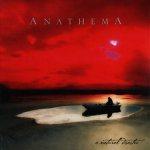 A Natural Disaster – 2003
A Natural Disaster – 2003

This album is revered by many fans and it certainly is quite the leap in style, if not lyrical content. While I think many of the songs are wonderful, there are places where it doesn’t work so well, so I would not call it a perfect release (I mean, those are hard to come by, let’s face it). Nonetheless, this album really finds the Cavanaghs and drummer John Douglas spreading their wings as writers and arrangers into new areas that only the likes of the aforementioned Radiohead and Porcupine Tree were heading in (amongst popular bands, that is). That is, a revival of rock as serious artform, with expansive arrangements and ambient music flourishes to really stimulate the heart and mind — and that required an attention span and a serious mindset to appreciate. A slight decrease in overall gloom did help, too. Still, it’s very melancholy and moody … the arrangements often meander, which takes some getting used to, as on the opener, “Harmonium“. The experimentation with dynamics in Vincent’s style do as well. There are spectacular things here, though: a success in creating an atmosphere of high drama in “Flying“, with its insistent, repetitive guitar melody; another touching song of bereavement sung by Daniel, “Are You There?” (“One Last Goodbye” part II, maybe). Lee Douglas, John Douglas’s singing sister, makes her proper debut here on the title track and is as lovely-sounding as she would remain in future, even if the song is an underwhelming blues number. While some songs, like “Electricity”, veer pretty close to the soft-rock end of the Brit-pop spectrum, the rocker “Pulled Under at 2000 Metres a Second” also kind of sticks out amongst all these moody slow burners, but several great songs make the album a worthy listen. And there was a third Cavanagh added to the mix in bassist Jamie!
 Hindsight – 2008
Hindsight – 2008

We all know the “unplugged” thing became de rigeur in rock for established bands; release an album of your hits played acoustically and get on more mall radio stations. However, smart bands have used the format to radically reinterpret their songs and give them a totally different feel. One great example is The Church’s fine acoustic album, El Momento Descuidado. I didn’t have super-high hopes for this particular album but it won me over thoroughly with its classy piano/acoustic guitar/ebow guitar/cello format and thoughtful arrangements. A track like “Fragile Dreams” goes from alternative metal to chamber rock quite easily. “One Last Goodbye” and “Temporary Peace” are no-brainers — the group vocals at the end of the latter are really lovely. The winner, though, is “Are You There?“, a very electronic, languid number on A Natural Disaster here totally transformed with robust fingerpicking, a beautiful lead vocal and stunning choral background vocals — the sheer beauty of the performance and arrangement are worth the price of the album, and this is the better version by far. Even an old doom track, “Angelica”, becomes a pretty folksong when given this treatment. One of the best “unplugged” albums out there.
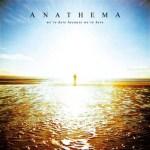 We’re Here Because We’re Here – 2010
We’re Here Because We’re Here – 2010

Having established a new direction, the band didn’t release an album of new material for seven years. I’m not up to speed on what the reason was, though their label going under might have been a factor. Anyway, people probably had ‘em written off, but with their Kscope debut Anathema sure showed them! No previous listener could have predicted the new, almost sunny (though still philosophical, with a touch of melancholy) disposition on display here. The melodic and inspirational treasures are bounteous: the gorgeous piano ballad “Dreaming Light“, with its mystic sentiments of pure love (and its awesome, sky-high shoegaze-style guitar-and-strings interlude), the bouncy, sunny but mystical piano pop of “Everything” (“Everything is energy and energy is you”), the driving psych/post-punk opener, “Thin Air”, with its buzzsaw delay-drenched guitar that would make The Edge drool with envy; but also nods to the band’s past in the hyper-dramatic epic “One Simple Mistake”, which also has a great, heavy, almost Zeppelinesque hard rock middle section; and the Sunshine Pop harmonies of “Summernight Horizon”. Vincent Cavanagh, he of the golden pipes, has finally nailed his own style for good, somewhere between perfect AOR technique and art-rock eccentricity, and his vocal blend with the newly promoted Lee Douglas is quite heavenly — they complement one other and drive each other to greater heights. You can hear echoes of the band’s previous more ponderous sound, but now it’s a flavor in a richer blend, and this new inspirational Anathema was justly praised for its depth, both lyrically and musically. Honestly, how “Dreaming Light” was not a giant, super-sized mega-hit, I just don’t know … I guess there’s just too much genuine beauty and emotional intelligence in the song.
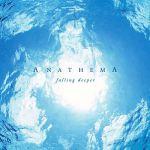 Falling Deeper – 2011
Falling Deeper – 2011

This is an album I put off acquiring, but I’m kicking myself. I reckoned orchestral re-arrangements of old doom metal songs could sound okay but might not be that interesting for someone who’s not a fan of said songs. After all, the Cavanaghs had a bit of a mania for doing re-arrangements of their old songs. What I didn’t know is that these are total re-imaginings, not just adaptations. The album is practically all instrumental, with the vocals mostly just inserted as part of the mix for occasional texture, except for a lovely lead vocal by Anneke von Giersbergen of prog-metal The Gathering fame. Dave Stewart’s (National Health, a Canterbury-related seventies prog band) string arrangements are impressionistic (reminding me a bit of Vaughan Williams, actually) and perfectly match the band’s tone of melancholy, especially when matched with Daniel Cavanagh’s piano and newfound friendship with the ebow, which creates elegant lines to match the bowed instruments. Despite the drums, this is not really a rock album; it’s more “modern classical” in some regards, which ironically is really popular with ambient hipsters right now. I prefer this band’s dedication to maximum, overpowering beauty to the stylized melancholy of (admittedly very good) acts like A Winged Victory for the Sullen that super-cool people are salivating over these days. There’s not much point in picking out highlights, except to point out that the closer, “Sunset of Age“, gets rock-y toward the end with an unexpected tasty guitar solo. Taken outside the context of the band’s repertoire, it’s a release that would greatly appeal to modern classical or ambient fans; taken within it, it’s not indicative of the rest of the discography but emphasizes an aspect of it: the beauty of the arrangements. Don’t miss this one.
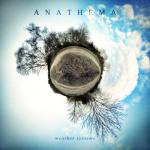 Weather Systems – 2012
Weather Systems – 2012

This was the one that did it for me. It is a perfect art-rock album and a major statement of intent that has already provided me with hours of solace. It’s got it all: elaborate string arrangements (again courtesy Dave Stewart); powerful vocals from all three singers (soooo powerful); endless build-ups and crescendos, one after the other, that would make any post-rock band proud (except these ones actually resolve into real musical parts!); perfect, classy choices of melodies, harmonies, guitar parts; and a naked emotional tone that is unmatched by almost any album I’ve heard, a desperately fierce clinging to the concept of transcendence, both in life and death. The one-two punch of “Untouchable” parts one and two, a paean to a lost loved one, part one being a storming atmospheric folk-rocker (an incredible finger-picked progression starts the song) and part two being a weeper of ballad expressing resignation but also transformation through grief, is irresistible. Then there’s the way the slow-burning buildup of “The Gathering of the Clouds” dissipates into the delicate broken chords of the majestic “Lightning Song“, and Lee Douglas’s utterly beguiling vocal; there’s the awesome combination of chaotic electronica with the Floydian textures of the second half in the lengthy “The Storm Before the Calm”; there’s the spacious melancholy and undistilled joy of “Sunlight”, both arrangements as thrillingly wide as a mountain view. And it’s all capped off by a riveting spoken-word declamation by near-death survivor Joe Geraci, leading into a howling declaration of faith in eternal life, “Internal Landscapes”. That song damn near makes me a believer, but honestly, you don’t have to believe it to be affected by it, like all great spiritual fervour. I don’t believe in Narnia either but I sure did love those books growing up. This is one of the most uplifting albums I own, even in its darkest, most sorrowful moments. Can you tell I like it?
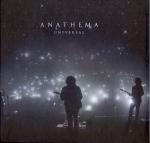 Universal/Untouchable – 2013
Universal/Untouchable – 2013

This is a live album taken from the band’s filmed concert at Philippopolis Roman amphitheater in Plovdiv, Romania, with the local symphony orchestra backing them up. It’s a fine example of a high-quality live album, with that extra real-life immediacy and vibrancy that provides a slightly different, more upbeat flavor to songs like “Untouchable” (1/2) and “Everywhere”. Still, the DVD contains far more tracks than the album, and I question some of the album inclusions and exclusions, like “A Natural Disaster” over “Lightning Song”, but I guess it’s not my band, is it? The DVD version is unquestionably worth your money, though — director Lasse Hoile is clearly a visual genius, because this is the best-shot music DVD I own, and I own a lot of them. The cameras are all over the place, bringing out the character and charm of the players with candid moments, exchanged smiles (even from the backing orchestra), and well-chosen audience reactions. It’s a really heartwarming, unifying concert experience that covers a broad section of the band’s discography, and I wish I’d been there! So hats off to Hoile for perfecting his craft; any director can film a concert but few can truly bring it alive. The concert program as presented on the DVD is well chosen, with older material like “Flying”, “Deep” and “One Last Goodbye” as well as more recent highlights from Weather Systems and We’re Here Because We’re Here. If you end up liking this band, you most certainly should own this DVD.
There are some older DVDs as well, Were You There from 2004 and A Moment in Time from 2006, which give a good indication of where the band was at artistically and visually and are worth watching, but a comparison with Universal makes it clear just how far this band has come on its artistic journey.
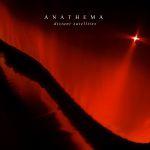 distant satellites – 2014
distant satellites – 2014

I reviewed this when it first came out in June 2014 (I think that was the month) but it’s had more time to sink in by now. And it’s sunk in well. This album is typical of the band in that it somewhat continues in a certain artistic direction, but it also takes risks, and some pretty big ones this time. The first half follows the template of Weather Systems, with a two-part opener, “The Lost Song” parts 1 and 2, the first one loud and brash, the second a piano ballad entirely reserved for Lee Douglas. The theme of this album is human relationships, a topic you’d think was done to death, but the Cavanaghs somehow manage to wring some more genuine profundity from the subject. “Ariel” is one of the most beautiful rock ballads ever written and recorded (and no, I don’t need to have heard them all to know this), beginning with Lee in a vocal tour de force, a commanding performance of controlled emotion, accompanied by a simple, repetitive piano part but soon gaining leviathan strength and cresting with great call-and-response male/female vocals, a powerful and uplifting guitar solo and a delicate outro. The lyrics are simple and direct but incredibly moving. The closer, “Take Shelter“, and the title track take the sound in an entirely new direction, with a very aggressive use of beats; not hip hop or trip-hop groove beats per se — more inserted up front as a key instrument and focus of attention, beats scattered here there and everywhere, building up along with strings, guitars and emotive vocals into overpowering crescendos. It’s really quite something, I have to say, and a great achievement that may not please all fans but should at least impress them. It could have been a disaster — look at this group of proggers playing around with beats — but it really does work. Weather Systems is still my preferred album, but to put it in context, this is still the best rock album of 2014 for me; even the lesser songs have wonderful distinguishing traits, like the planetary scope of the guitar solo on “Anathema” (probably D. Cavanagh’s best ever on record) and the interesting modern classical break on “Dusk (Dark is Descending)”. A very daring record overall and one that has also been justly praised, universally. It’s really hard to understand why this music has not “broken through” into more mainstream appreciation, but ultimately, who cares? It’s enough that it exists for us to enjoy, innit.
Okay, my ardour has been fully expressed now, until the next album, that is…
Band site



